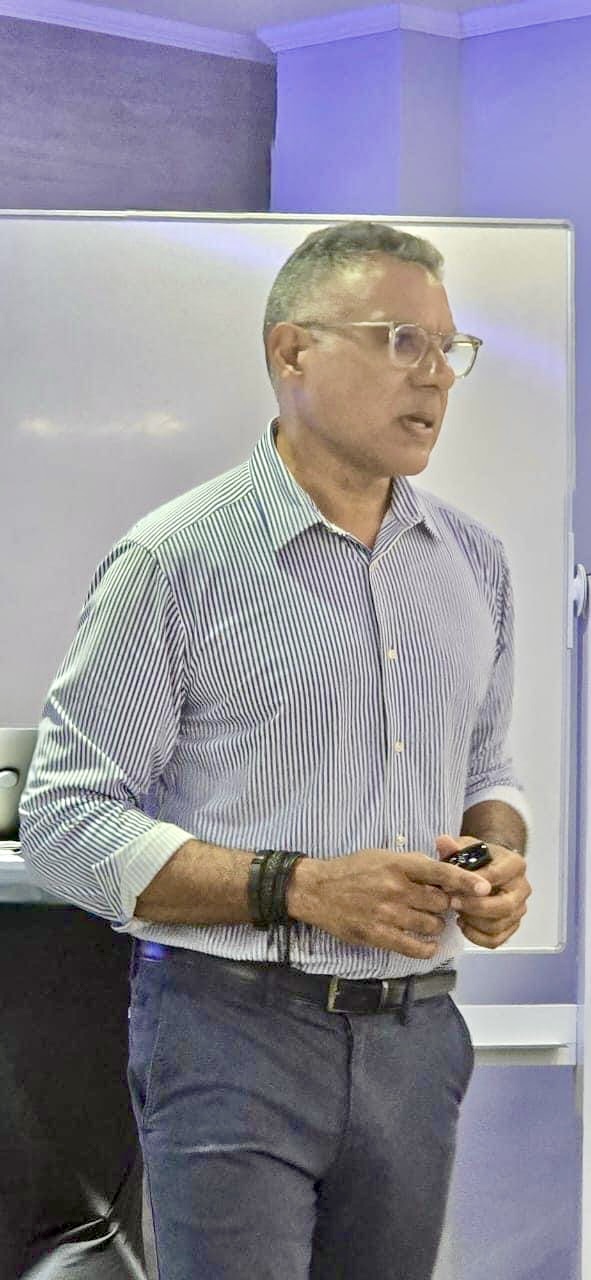WARNING: THIS IS NOT A COLUMN!!
We all know the feeling when you wake up one day and dread one (or more) thing (s). Whether it is “leg day” at the gym, you’re still sore from your last run or lift, or don’t feel like picking up the pen (or the keyboard) and cranking out another column for your readers. Well, that was me this weekend. First, I wondered what I would write about. Then I started telling myself that perhaps it is ok to skip a Monday column/newsletter and just go about the Sunday and get ready for a sunset New Orleans-style Jambalaya feast that my friend Kavey will be preparing later today alongside my youngest son, who wants to to go to culinary school and wants to learn to prepare the Jambalaya. Why the dreading? Well, I guess, like most, I can say things like: “I was busy”, “I am (so so so) tired or the dog ate my homework”. Instead, I will share with you what I did this past week that perhaps made me a bit sluggish.
Seminar Competition Law
Last Thursday, my firm Gomez Coffie Law held a seminar entitled: “Understanding Aruba’s New Antitrust laws for Realtors”. It covered, yes, you guessed it, an overview and explanation of the new antitrust, aka competition laws, that are in effect in Aruba as of January 1st, 2024. The seminar was specifically tailored to real estate brokers because the relevant authority had announced earlier this year that the realtors and the supermarkets were a sector of interest and a priority for review. It was a sold-out event, and Aruba’s finest realtors, agents, and brokers attended. We also had participants from other sectors who wanted to understand the new law and the relevant principles because the principles apply to every business, whether providing a service or selling a product. In good theory, it also applies to government-owned or controlled enterprises. I say this in good theory because I am waiting to see if the authority will address unfair competition practices in those state enterprises or if they will focus on the private sector and shy away from any potential political confrontation. At the end of the day, the authority is created by the government (by law) and for instance, all fines and penalties collected by the authority go to the state’s treasury. Time will tell. We will see. I sincerely hope that the authority will call it straight down the middle and nondiscriminatory to the public and private sectors.
Immediate feedback
Back to the seminar, preparing the presentation and handling the logistical details was a bit time-consuming, but that all paid off on game day, when the attendees were very active and engaged in the conversation. Once they grasped the basic principles, they could quickly identify other sectors where they thought unfair competition practices were taking place or where cartels were active. Many questioned why the rates and charges of the banks in Aruba seemed so similar. Coincidence or price fixing, they asked? Have the contractors in Aruba participating in bids organized by the government’s Department of Public Works (DOW) actively engaged in bid rigging? And if so, how much taxpayers’ money has slipped away into these pockets? In the Netherlands, in the famous “Construction Fraud of 2001,” it is estimated that it costs the Dutch taxpayer between 15 and 25 billion euros. Monies that, if otherwise had been allocated, would have been enough to eliminate poverty in the Netherlands!!! These construction companies would have never expected that one of them was the whistleblower who brought this scandal to light. Other sectors that were also questioned like: septic trucks and a particular telecommunications provider. All this tells me that the attendees benefited from the content provided and could understand it and apply it not only to their business but also to the businesses they buy from. The latter is essential because is new competition law’s most important purpose is to provide more consumer protection and promote a healthy and efficient market.
Next
Following the seminar, due to the requests received from both those who could make it last Thursday and those from other sectors, we will be holding another seminar on the subject, this time focusing on “business owners and general managers” so that they too can get their feet wet on the topic and if need be a pivot to comply with the competition laws and of course avoid both fines and penalties and avoiding reputational damage in case the authority sanctions them. The seminar will be held on April 4th, 2024 from 8:00 am to 11:30 am and will take place at the ATIA Building’s conference room. You can get more information and register here.
Aircraft arrested
Meanwhile, I have been working with colleagues on a Curacao aviation case. I can’t say a whole lot about this one yet, but the local media did do a piece about it. In short, the article explains that a Boeing 737-500 belongs to Albatros airline from Venezuela. Why the arrest? Well, you typically get your aircraft arrested when you don’t pay your bills, and the arrest is used to secure payment. The article explains that the airline owes a Florida-based aircraft parts vendor close to US$ 500k. Certainly, it is not an amount most of us have sitting in our current accounts, but it should not be a reason to keep an aircraft on the ground for an airline. The airline started a court case to get the embargo released by the court. The article states that the court denied the request. The litigation is not over; meanwhile, another set of cases have been filed. By the time you read this Monday a.m. I will be in Curacao, most likely in the courtroom, assisting with demands made by the parts vendor, whom I co-represent – and defend against two demands filed by the airline and a third party. I am so looking forward to this litigation in Curacao. The only drawback is that due to the limited airlift available between Aruba and Curacao, I won’t be able to return home the same day and will have to overnight in Curacao, even though I should be done in court by lunchtime. Ah, well, no biggie. I will keep myself busy and move a competition law-related meeting on Monday afternoon to Zoom or Teams.
Friday
Friday was spent planning the next seminar, preparing the certificates of appreciation for the attendees, and attending clients. It was one of those days with a client lunch and dinner on the same day. This unusual event called for an extra 2Ks on my Saturday a.m. run and a longer swim, but it was all good. The benefits of living in Aruba and where I live are that I can walk (or run) to the beach and go for an open-water swim. It is also great for clearing the sinuses and loading up sodium.
Tobio
While all this was happening, my trusted companion and Boston-Terrier “Tobio” was right there with me. He sleeps in my room. He is on my lap when I drive, and most of the time, he is either at my feet, on my lap, or at my desk (or work table) next to my laptop. We keep our daily steps in sync by taking walking breaks during the day and maintaining flexibility by stretching. Tobio does a very nice “downward dog”-yoga pose. No pun intended.
Anyway
This is all I have for you this week. I got a pack, a carry-on, and my lawyer’s toga to catch my next flight. #YourFavoriteLawyer #YourFavoriteColumnist













